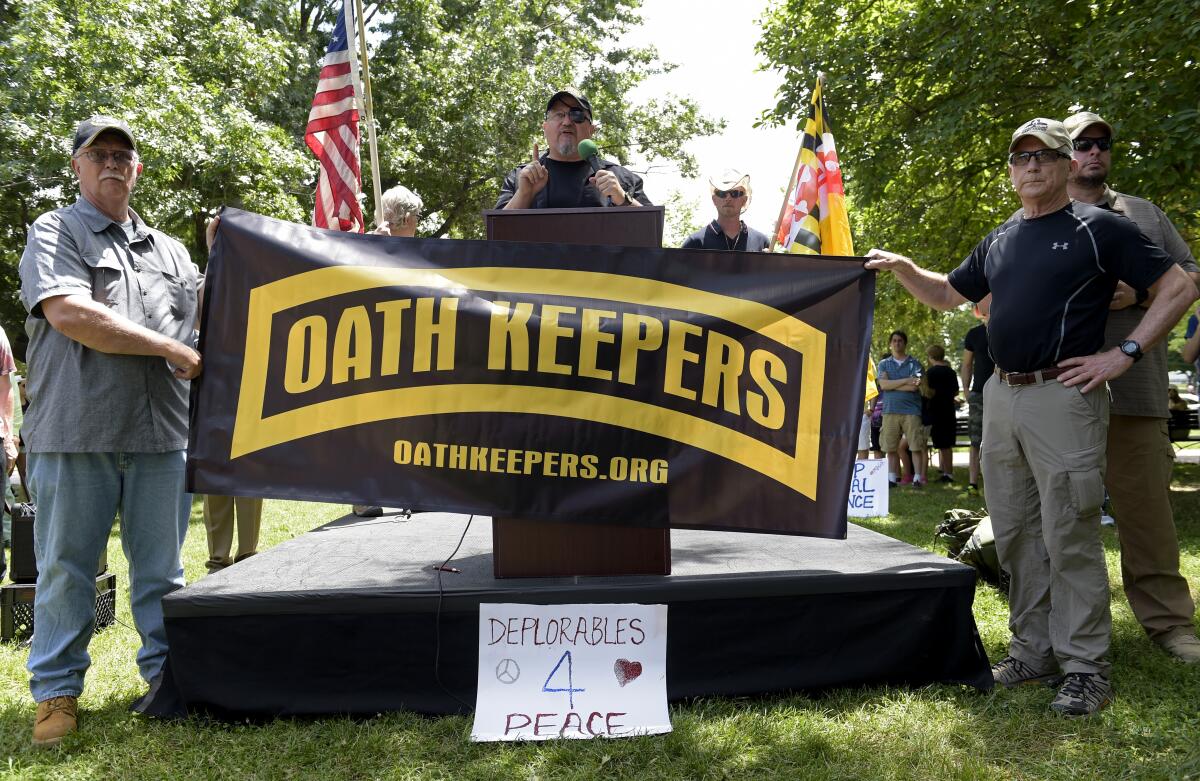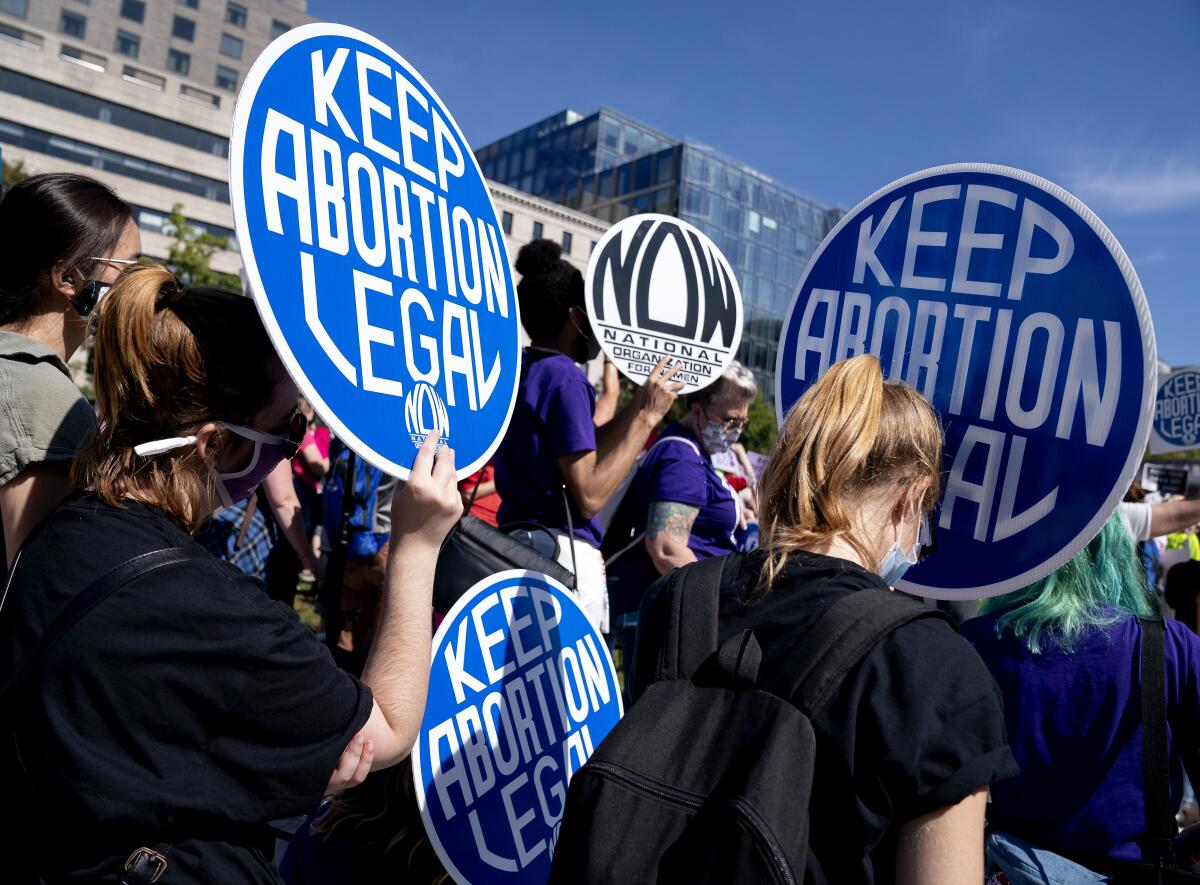Oath Keepers: Who they are, and what they stand for

- Share via
Good morning, and welcome to the Essential California newsletter. It’s Tuesday, Nov. 16. I’m Justin Ray.
Recently, The Times published an explosive story about Tasha Adams, the estranged wife of Stewart Rhodes, founder and leader of the Oath Keepers.
Earlier this year, the conspiratorial militia organization drew scrutiny after some of its members were accused by federal authorities of having played a crucial role in the Jan. 6 insurrection. They also received attention after heavily armed members of the group cropped up in Ferguson, Mo., during unrest on the one-year anniversary of the 2014 fatal police shooting of Michael Brown. Their presence alarmed protesters.
But they have had a presence in California, too. In late September, a whistleblower group named Distributed Denial of Secrets made a lot of information about the Oath Keepers public, including emails, chat logs and a list of members. It was revealed through the leak that Riverside County Sheriff Chad Bianco was a paying member in 2014. “Like many other law enforcement officers and veterans who were members, I learned the group did not offer me anything and so I did not continue membership,” Bianco said in a previous statement to The Times.
That list also contained the names of a corrections officer in Riverside, as well as Michael Lynch, an officer with the Anaheim Police Department, according to USA Today. The organization also reportedly had a booth at Urban Shield. The controversial annual event, which was organized and hosted by the Alameda County Sheriff’s Office, had been attended by law enforcement across America before it was discontinued in 2019.
To understand who the Oath Keepers are and what they believe, here are three important things to know about the organization.
How the Oath Keepers were founded and what the name means
The Oath Keepers were founded in 2009 by U.S. Army veteran and Yale Law School graduate Stewart Rhodes. They claim to be nonpartisan and are made up of current and former members of the military and law enforcement. And these careers are fundamental to the group’s name: They believe that once you take the oath to uphold the constitution, you must fulfill your duty until the day you die.
Why they are called extremists
Those who join must swear an oath to support and defend the Constitution as they understand it — even if that interpretation goes against the law. The group has a list of 10 “Orders We Will Not Obey,” which the Southern Poverty Law Center called a “compendium of much-feared but entirely imaginary threats from the government.”
“They’re conspiracy theories that construct a world view where the federal government is on the brink of tyranny and is going to take everyone’s guns away and take everyone’s rights away and put people in concentration camps,” ProPublica’s Isaac Arnsdorf told Vox’s “Today Explained.” “That’s how they start pushing people down this path of fear and extremism.”
How many members make up the organization
The U.S. Department of Justice has described it as a “large but loosely organized collection of individuals.” The list of members from Distributed Denial of Secrets revealed more than 35,000 people. ProPublica identified 48 state and local government officials on it. They were all Republicans. The list also revealed that more than 400 people signed up for membership or newsletters using government, military or political campaign email addresses.
Further reading:
Tasha Adams devoted her life to supporting her husband, Stewart Rhodes. She worked as an exotic dancer to pay for his college and took care of him when he accidentally shot himself in the face. When he was looking for direction in life, she helped him start the Oath Keepers. With congressional committees and federal investigators examining the threat posed by the group, Adams has been conducting an exploration of her own life and culpability in the forming of the Oath Keepers. “If I hadn’t helped him start it, I mean, there would probably still have been an insurrection,” Adams, 49, says in an interview. “But what would it have looked like? That is what I’m trying to figure out.”
And now, here’s what’s happening across California:
Note: Some of the sites we link to may limit the number of stories you can access without subscribing.
L.A. STORIES
Los Angeles County officials worry that the holidays could lead to another winter surge of coronavirus as people who got vaccinated earlier this year lose immunity. Officials are urging the vast majority of adults to get a COVID-19 booster shot as soon as possible. Without a booster, health officials warn, vaccinated people will be at greater risk of breakthrough infections, which can lead to hospitalizations and death among the most vulnerable. “If you think you will benefit from getting a booster shot, I encourage you to go out and get it,” Dr. Mark Ghaly, California’s secretary of health and human services, said during a briefing last week. Los Angeles Times
For domestic violence survivors, restraining orders offer little protection. Court-issued restraining orders are often considered the best protection survivors of domestic violence can get from an abuser. They require documentation, a judge’s approval, and, in California, violators can receive a year of jail time. But domestic violence survivors, advocates and even some in law enforcement describe a fundamental flaw in the system: An abuser who violates a restraining order rarely faces consequences. “It’s common knowledge that nothing happens when restraining orders are violated,” said Rachelle Neshkes, a senior attorney at the Los Angeles Center for Law and Justice. CrosstownLA
Our daily news podcast
If you’re a fan of this newsletter, you’ll love our daily podcast “The Times,” hosted every weekday by columnist Gustavo Arellano, along with reporters from across our newsroom. Go beyond the headlines. Download and listen on our App, subscribe on Apple Podcasts and follow on Spotify.
POLITICS AND GOVERNMENT
The Senate’s longest-serving Democrat announced Monday he won’t run for reelection next year, a decision that would move California Sen. Dianne Feinstein into the role and potentially into the presidential line of succession. Sen. Patrick Leahy (D-Vt.) chose to retire after serving eight terms in the Senate. Leahy’s departure from the Senate, expected in early 2023, would make Feinstein the longest-serving Democratic senator. If Democrats retain control of the Senate after the 2022 midterm election, she would be poised to become the Senate president pro tempore, the first woman to hold the constitutionally designed post. The position is elected by the Senate, but for decades the position has gone to the most senior member of the majority party. The office holder is third in the presidential line of succession after the vice president and speaker of the House. Los Angeles Times
How deep-blue California has become a congressional battleground. While other states — Texas, Illinois and North Carolina among them — have redrawn their political maps to protect the parties in power, California could have as many as 10 reasonably competitive House races in 2022, based on the preliminary maps issued last week by the state’s Citizens Redistricting Commission. “Fundamentally, the fight for the House is not a national election,” Nathan Gonzales, editor and publisher of the campaign tip sheet Inside Elections, pointed out. “It’s a district-by-district battle and California is one of the wild cards.” Los Angeles Times
CRIME AND COURTS
A father was shot in the face while holding his 5-week-old baby in their own home in Oakland. That dad survived the Saturday shooting, but his family now fears for their safety and questions if the incident was a hate crime. “I just started screaming ‘get down, get down, get down’! Our daughter, our 4-year-old, was crawling towards me and I moved her towards the kitchen and he put the baby on the floor,” says Jimmie, whose full identity was not disclosed for fear of safety. His husband was injured in the shooting. “I’m trying to figure out if it’s because we’re gay. I just can’t believe that this is random.” Oakland police will only say there was a shooting, but won’t say if they are investigating the case as a hate crime. No arrests have been made. ABC 7 News
Support our journalism
HEALTH AND THE ENVIRONMENT
With access to abortion at stake across the U.S., California is getting ready to become the nation’s abortion provider. Gov. Gavin Newsom and legislative leaders have asked a group of reproductive health experts to propose policies to bolster the state’s abortion infrastructure and prepare it for more patients. Lawmakers plan to begin debating the ideas when they reconvene in January. But abortion providers are already girding for a surge in demand. Planned Parenthood clinics in California say they already serve about 7,000 out-of-state patients a year and are expecting more, especially in travel hubs like the Los Angeles area. Los Angeles Times

‘We know we can do it. Now it’s a matter of how well can we do it.’ Barely a mile from the southern shore of the Salton Sea — an accidental lake deep in the California desert, a place best known for dust and decay — a massive drill rig stands sentinel over some of the most closely watched ground in American energy. There’s no oil or natural gas here. Instead, an Australian company is preparing to tap a buried reservoir of salty, superheated water to produce renewable energy — and lithium, a crucial ingredient in electric car batteries. The $500-million project is finally getting started after years of hype and headlines about the Imperial Valley someday becoming a powerhouse in the fight against climate change. Los Angeles Times

CALIFORNIA CULTURE
‘I totally did not want to have a baby on the lawn.’ Emily Johnson wasn’t due to give birth for another week, but she began experiencing contractions five minutes apart. It was then that she realized she might possibly give birth that day. She tried to get into a vehicle, but only made it to the front lawn. That’s where her son Thomas Johnson ended up being born, which was captured on the family’s Ring camera. Emily and her husband Michael say they do want to have another baby someday, and they plan to go to the hospital extra early in future. Big Country Homepage
Her husband was killed in the Bay Area’s deadliest mass shooting. Amid healing, outrage remains. Nearly six months after the San Jose rail yard shooting, attention to the tragedy has faded. But for Terra Fritch, wife of victim Alex Fritch, it continues to impact her life. While many people touched by firearm violence become advocates for gun control, Terra is more interested in making it easier for families to get the resources they need after tragedy strikes. “Clearly, after Sandy Hook, our country is OK with kids getting killed,” she said, referring to the 2012 elementary school shooting in Connecticut. “If you can’t keep mass shootings from happening then, just like earthquakes, you need to prepare for when they happen.” San Francisco Chronicle
The trampoline park business is up and down and up and down and up and down. It was an idea that defied conventional logic. Fill a 20,000 square-foot warehouse with trampolines and hope you attract enough paying customers to outpace rent, maintenance, payroll and insurance claims. The premise, it turns out, proved popular and surprisingly profitable — at least until the pandemic. Before COVID-19, trampoline parks were popping up throughout the country, sometimes right near an existing park. Monthly profits of $150,000 were not unheard of. Los Angeles Times
Free online games
Get our free daily crossword puzzle, sudoku, word search and arcade games in our new game center at latimes.com/games.
CALIFORNIA ALMANAC
Los Angeles: Overcast 72 San Diego: Overcast 71 San Francisco: Cloudy 63 San Jose: Cloudy 68 Fresno: Overcast 70 Sacramento: Overcast 64
AND FINALLY
Today’s California memory is from Valerie Cantella:
Before my freshman year in high school, 1984, my parents decided we were moving to their home state. They took turns driving our two cars and tent trailer from Illinois to Santa Barbara. A few days after starting the journey, my dad and I were in the Fiat, the top off, headed north on the 101. We passed a sign for Ojai. I said, “Oh-Jay. That’s a strange name for a city.” My dad corrected me and started describing the many unusual names I’d come to learn. I remember it fondly each time I pass that same sign today.
If you have a memory or story about the Golden State, share it with us. (Please keep your story to 100 words.)
Please let us know what we can do to make this newsletter more useful to you. Send comments to essentialcalifornia@latimes.com.
Sign up for Essential California
The most important California stories and recommendations in your inbox every morning.
You may occasionally receive promotional content from the Los Angeles Times.




